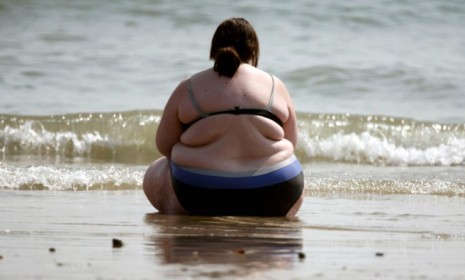The U.K.'s failed pre-Olympics weight-loss program
British Olympic organizers pledged in 2005 to get two million U.K. citizens to exercise more before the games, but the initiative flopped. What went wrong?

A free daily email with the biggest news stories of the day – and the best features from TheWeek.com
You are now subscribed
Your newsletter sign-up was successful
When the U.K. was awarded the 2012 Summer Olympics seven years ago, British Olympic organizers vowed to use the win to inspire two million Britons to get more physically active before the London Games opened. Well, the Olympic torch will be lit on July 27, and the U.K. has failed to get its target number of couch potatoes off the couch. What went wrong? Here, a brief guide:
How overweight are Brits?
The U.K. is the fattest nation in Western Europe, and its citizens have been packing on the pounds recently. Twenty-six percent of British adults are obese, up from 15 percent in 1993. According to a study published Wednesday in medical journal The Lancet, British citizens have one of the most sedentary lifestyles in the world. Roughly 63 percent of the population is defined as inactive, compared to 40.5 percent in the U.S. and 32.5 percent in France. The U.S., where 36 percent of adults are obese, is still fatter, but the British are catching up, fast.
The Week
Escape your echo chamber. Get the facts behind the news, plus analysis from multiple perspectives.

Sign up for The Week's Free Newsletters
From our morning news briefing to a weekly Good News Newsletter, get the best of The Week delivered directly to your inbox.
From our morning news briefing to a weekly Good News Newsletter, get the best of The Week delivered directly to your inbox.
How had the British government planned to fix that?
It developed formal plans to get 1 million citizens more interested in sports, mostly by creating free sports programs in schools for kids. The government pledged to energize another 1 million people by encouraging them to bike, walk to work, or otherwise get off their butts. Despite some success in the first years after the Games were awarded, the government later largely abandoned its pledge. At the current rate, one expert estimated, the U.K. won't reach the target of 2 million more physically active people until 2035.
Why did the U.K. give up?
Money. The British government has been self-imposing deep spending cuts to keep its head above water as Europe's debt crisis expanded. Sports programs for adults, such as free swimming in London, were scrapped or drastically reduced. Olympics secretary Jeremy Hunt said the government is still trying to help local athletic clubs recruit more participants, and a government official added that the original targets were "arbitrary," anyway.
A free daily email with the biggest news stories of the day – and the best features from TheWeek.com
Was this a squandered opportunity?
Maybe. But the original goals might indeed have been a bit unrealistic, Bill Kohl of the Texas School of Public Health, who wrote the study published in The Lancet, tells The Associated Press. "The Olympics do inspire people, but there is no evidence there are increased physical activity levels afterwards," he says. No host country has really managed to convert Olympic enthusiasm into a fitness craze, in part because pudgy ordinary folks can't seem to relate to world-class athletes. "If you see somebody in Lycra at the Olympics on a 10,000-pound ($15,600) bike," Canterbury Christ Church University sports expert Mike Weed says, "that says this is not for you."
Sources: Associated Press, The Lancet, Washington Post
-
 6 of the world’s most accessible destinations
6 of the world’s most accessible destinationsThe Week Recommends Experience all of Berlin, Singapore and Sydney
-
 How the FCC’s ‘equal time’ rule works
How the FCC’s ‘equal time’ rule worksIn the Spotlight The law is at the heart of the Colbert-CBS conflict
-
 What is the endgame in the DHS shutdown?
What is the endgame in the DHS shutdown?Today’s Big Question Democrats want to rein in ICE’s immigration crackdown